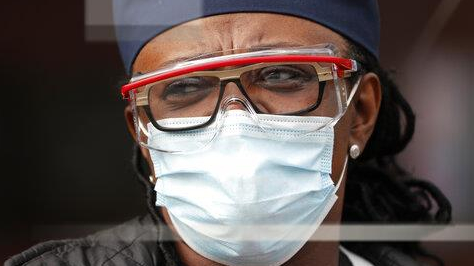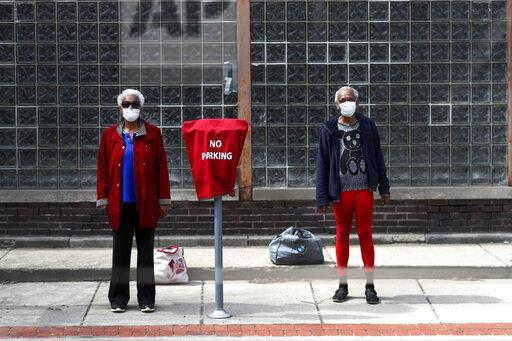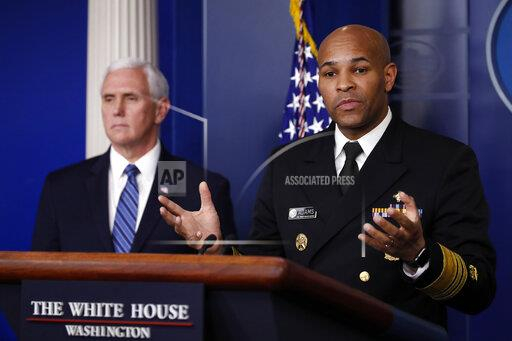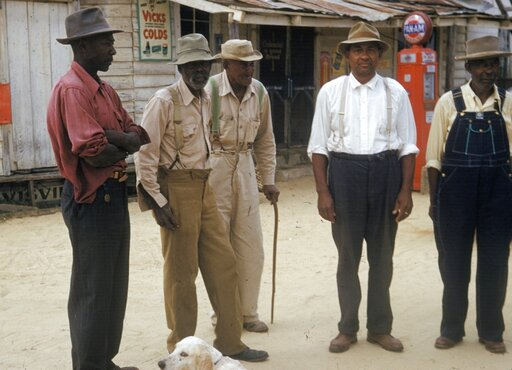
Being black in America may be hazardous to your health, it has been said.
In the age of COVID-19, that much seems to be true, judging from early data showing that the disease is hitting African Americans particularly hard.
Not all states have been providing data on the racial makeup of the victims of the disease but an alarming trend has developed among some of those that do.
In Illinois, black people account for 40 percent of coronavirus-related deaths in the state but just 14.6 percent of its population, according to statistics provided by the state's public health agency.
The situation is starkest in Chicago, the most populous city in Illinois.
"Fifty-two percent of our cases have been in black Chicagoans, and, most strikingly, 72 percent of our deaths here in Chicago," Chicago Public Health Department Commissioner Dr. Allison Arwady said on Monday.
In Michigan, black people account for 40 percent of the state's reported deaths, according to data released by the state, but its population is only 14 percent African American.
Chronic disease burden
Similar disparities have been reported elsewhere, leading to growing calls for federal authorities to provide full demographic data on the impact of the disease.
"If this pattern holds true across other states and cities, this virus could have a catastrophic impact on black people in this country," New York Times columnist Charles Blow wrote on Monday.

Sharon Hancock, left, and Shelia Theresa Adams pose for a portrait as they wait for the bus after visiting a friend in downtown Joliet, Illinois, April 6, 2020. Chicago's mayor says the city is launching a health campaign focused on black and brown communities. /AP
Sharon Hancock, left, and Shelia Theresa Adams pose for a portrait as they wait for the bus after visiting a friend in downtown Joliet, Illinois, April 6, 2020. Chicago's mayor says the city is launching a health campaign focused on black and brown communities. /AP
It has long been known that African Americans suffer disproportionately from chronic diseases like heart disease, hypertension and diabetes, that research suggests, make them especially vulnerable to COVID-19.
A 2017 report from the American Heart Association said the burden of cardiovascular disease in the African American community is a primary cause of the gap in life expectancy between blacks and whites in the U.S.
Given this background and amid the coronavirus crisis, a United Nations panel of independent human rights experts – The Working Group of Experts on People of African Descent – warned on Monday that structural discrimination could worsen inequalities surrounding access to healthcare and treatment and lead to a rise in disease and death rates among people of African descent.
Congressional letter of concern
Dr. Summer Johnson McGee, dean of the School of Health Sciences at the University of New Haven, said it is no surprise that blacks are faring worse in the United States.
"A pandemic just magnifies the disparities in healthcare that many communities of color face," she said.

U.S. Surgeon General Jerome Adams speaks about the coronavirus in the James Brady Press Briefing Room of the White House, Friday, April 3, 2020, as Vice President Mike Pence listens. /AP
U.S. Surgeon General Jerome Adams speaks about the coronavirus in the James Brady Press Briefing Room of the White House, Friday, April 3, 2020, as Vice President Mike Pence listens. /AP
Five Democratic members of the Senate and the House of Representatives sent a letter to Health and Human Services Secretary Alex Azar on March 27 to remind him that "affordable and equitable access to care and treatment is essential to saving lives and slowing the spread of the coronavirus."
"Although COVID-19 does not discriminate along racial orethnic lines, existing racial disparities and inequities in health outcomes and health care access may mean that the nation's response to preventing and mitigating its harms will not be felt equally in every community," read the letter co-signed by former presidential candidates Elizabeth Warren, Kamala Harris and Cory Booker.
Their fears were confirmed in a report by Nashville Public Radio, which said the biotech data firm Rubix Life Sciences, reviewed recent billing information in several states and found that an African American with symptoms like cough and fever was less likely to be given one of the scarce coronavirus tests.
The UN independent panel cited another reason that could increase the risk of African Americans contracting the dreaded disease.

In this 1950s file photo released by the U.S. National Archives, men included in a syphilis study pose for a photo in Tuskegee, Alabama. Historic failures in government response to disasters and emergencies, medical abuse, neglect and exploitation have jaded generations of black people into a distrust of public institutions. Some might call it the Tuskegee effect, referring to the U.S. government's once-secret syphilis study of black men in Alabama, that one study shows, later reduced their life expectancy due to distrust of medical science. /National Archives via AP
In this 1950s file photo released by the U.S. National Archives, men included in a syphilis study pose for a photo in Tuskegee, Alabama. Historic failures in government response to disasters and emergencies, medical abuse, neglect and exploitation have jaded generations of black people into a distrust of public institutions. Some might call it the Tuskegee effect, referring to the U.S. government's once-secret syphilis study of black men in Alabama, that one study shows, later reduced their life expectancy due to distrust of medical science. /National Archives via AP
"In many States, people of African descent disproportionately serve as home health aides, carers and delivery personnel who help hospitals and health care systems focus on the most serious cases, despite no public efforts to ensure their safety and protection," the group said in a statement.
In America, they also tend to be over-represented in employment in such areas as grocery stores and public transit, which tend to remain open while other sectors may be shuttered during the pandemic.
Mistrust of health service
The Washington-based Economic Policy Institute noted last month that less than one in five black workers (19.7 percent) – consistent with the range of wages that they earn – compared with 29.9 percent of whites. (The share of workers who can telework was found to be highest among Asians, 37 percent, and lowest among Hispanics 16.2 percent).
Compounding the issues among African Americans is a pattern of mistrust in their country's health system.
Much of the analysis behind this state of affairs is linked to the disgraceful 1932-1972 "Tuskegee Study of Untreated Syphilis in the Negro Male" that allowed hundreds of African American men with syphilis to go untreated so that scientists could study the effects of the disease.
"People will quote the Tuskegee experiment as the reason why black people don't trust health care, but there's so much more than just that one example," activist Jahmil Lacey, who helped found a public health group for black men and boys in Los Angeles, told the Associated Press. "We don't trust systems that are connected to white supremacy. So, we have to do the work to repair it."
COVID-19 might just make that tough assignment just a bit harder.
Top Photo: Registered Nurse Shelia Rickman participates in an after-shift coronavirus demonstration, Monday, April 6, 2020, in Chicago's Hyde Park neighborhood. /AP